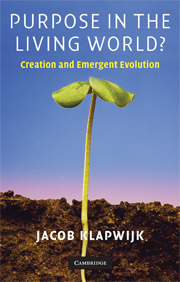Book contents
- Frontmatter
- Contents
- List of figures
- Preface
- Introduction
- 1 Does life on earth have a purpose?
- 2 Creationism, Intelligent Design, and Augustine's idea of time
- 3 Darwin, neo-Darwinism, and the naturalistic continuity claim
- 4 Miller's pre-biotic broth and the premises of evolutionism
- 5 A cold shudder along Darwin's back
- 6 The emergence theory of Morgan and Alexander
- 7 Luctor et emergo: what is emergent evolution?
- 8 Toward a general theory of emergent evolution
- 9 Hominization and the philosophy of mind
- 10 Augustinian faith and evolutionary science
- 11 The organism is a whole. The world is a habitat
- 12 The slumbering temptation of essentialism
- 13 Questions surrounding the emergence process
- 14 Enkapsis in nature. Is there an Omega point?
- Bibliography
- Index
8 - Toward a general theory of emergent evolution
Published online by Cambridge University Press: 05 June 2012
- Frontmatter
- Contents
- List of figures
- Preface
- Introduction
- 1 Does life on earth have a purpose?
- 2 Creationism, Intelligent Design, and Augustine's idea of time
- 3 Darwin, neo-Darwinism, and the naturalistic continuity claim
- 4 Miller's pre-biotic broth and the premises of evolutionism
- 5 A cold shudder along Darwin's back
- 6 The emergence theory of Morgan and Alexander
- 7 Luctor et emergo: what is emergent evolution?
- 8 Toward a general theory of emergent evolution
- 9 Hominization and the philosophy of mind
- 10 Augustinian faith and evolutionary science
- 11 The organism is a whole. The world is a habitat
- 12 The slumbering temptation of essentialism
- 13 Questions surrounding the emergence process
- 14 Enkapsis in nature. Is there an Omega point?
- Bibliography
- Index
Summary
Philosophers and evolutionary biologists have developed emergence theory primarily to enable them to give an account of the structural variety, diversity, and complexity that are characteristic of systems that function in living nature. The question must be asked: doesn't the theory of emergence have a greater radius of action? Isn't it also applicable to systems in culture, to the music of Bach and Mozart and to the theories of Newton and Albert Einstein? Don't we have solid arguments to speak of GTEE, i.e. a general theory of emergent evolution? Can GTEE shed light on the unique nature of humankind on the one hand and on the special character of the social institutions that humankind has produced on the other hand?
At stake here is a significant topic that was already being discussed in Darwin's time, in a century that witnessed the Industrial Revolution and momentous changes in society. In England the philosopher and sociologist Herbert Spencer became an eminent advocate of social Darwinism. Spencer compared human behavior to the behavior of animals, and the form of human associations to the structure of living organisms. His conclusion was that humankind is not unique, and that the struggle for life and the survival of the fittest are natural laws that extend themselves fully into human society. Thus society should provide opportunity for the entrepreneurial spirit of the liberal citizenry and should not frustrate this spirit by social measures in favor of the working classes.
- Type
- Chapter
- Information
- Purpose in the Living World?Creation and Emergent Evolution, pp. 139 - 159Publisher: Cambridge University PressPrint publication year: 2008

